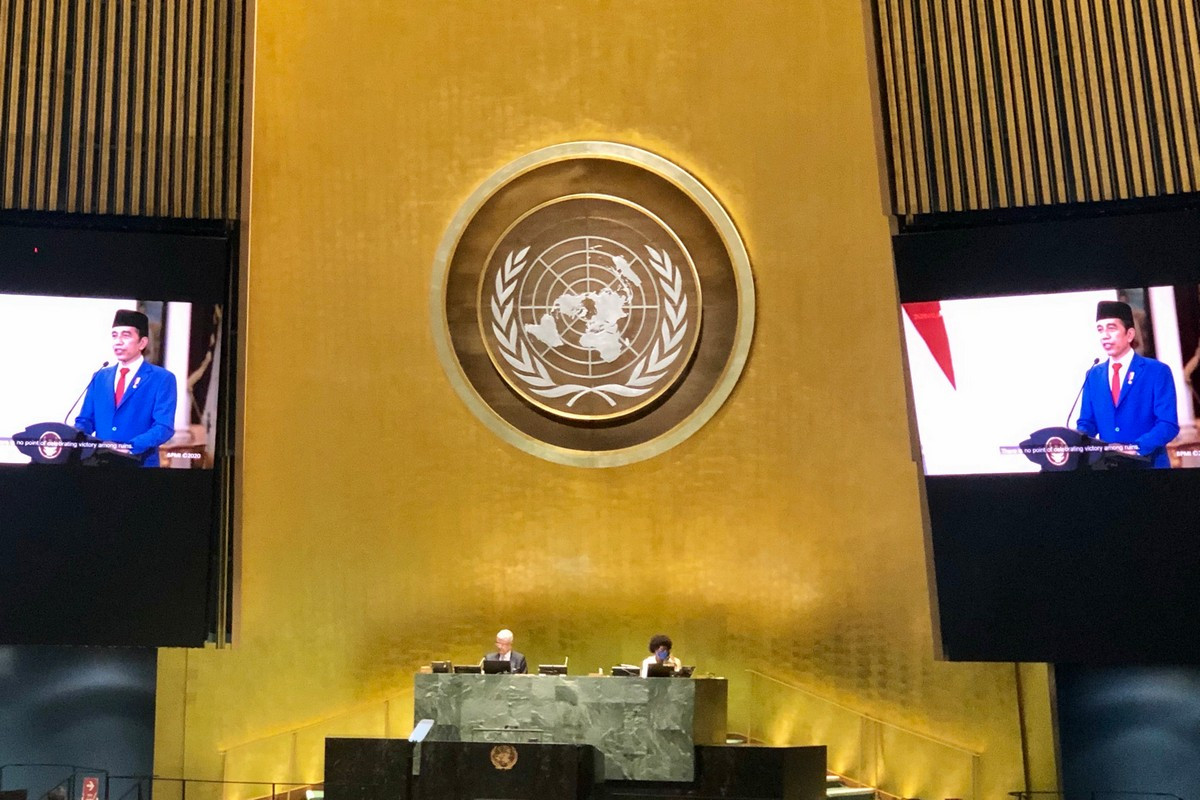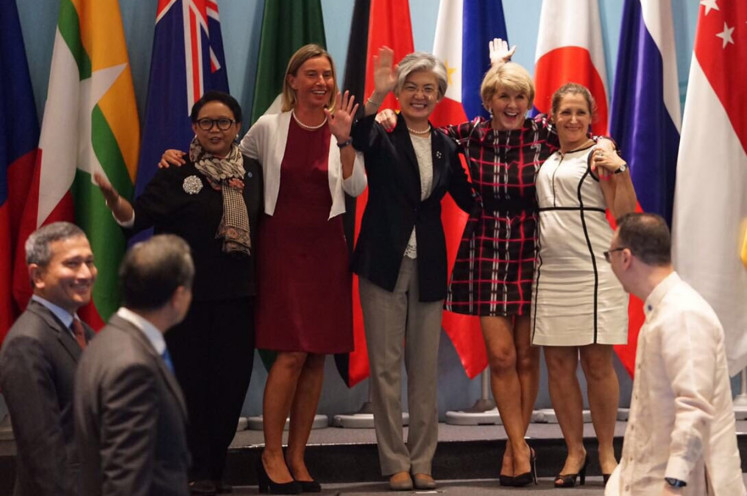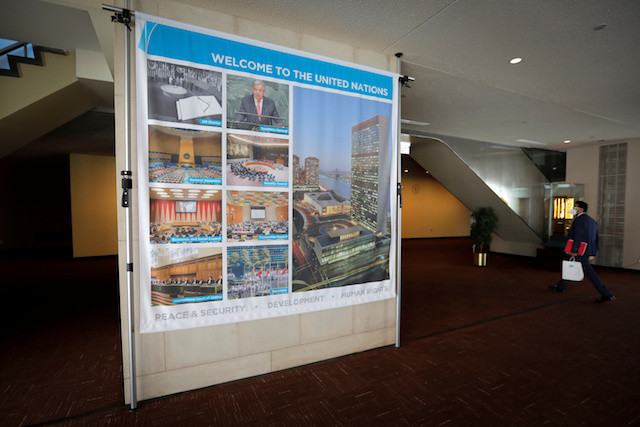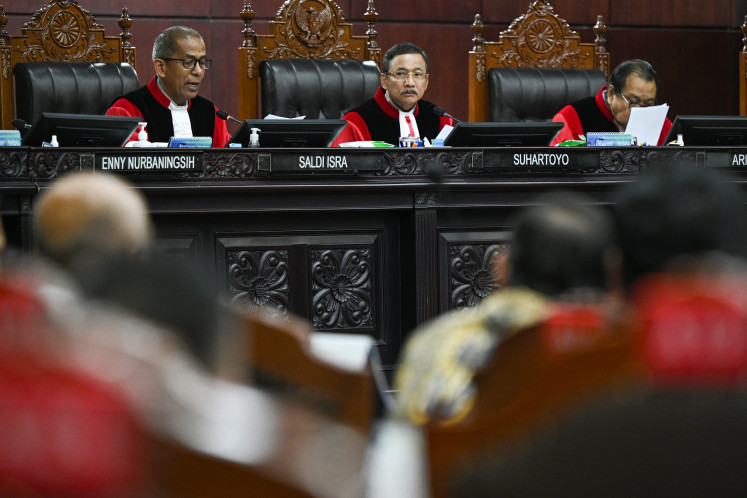Popular Reads
Top Results
Can't find what you're looking for?
View all search resultsPopular Reads
Top Results
Can't find what you're looking for?
View all search resultsPandemic reshapes Indonesia's UN diplomacy
More than just an opportunity for leaders to give a speech, the annual United Nations General Assembly meetings offer opportunities for diplomats to meet on the sidelines to ink agreements, follow up on past cooperation and start new initiatives. However, all of that has been upended by the coronavirus pandemic.
Change text size
Gift Premium Articles
to Anyone
A
s evident from the empty hallways and chambers of the United Nations headquarters this week, the coronavirus pandemic has resulted in major disruptions in diplomacy.
With the virus still raging across the globe, countries like Indonesia have no other choice than to adapt and adjust.
For the first time in the organization’s 75-year history, world leaders are not convening in New York as the UN General Assembly moves online.
Instead of having delegates of 193 countries descend on the UN building for a week of what resembles high-level speed dating, only one or two envoys from each country will be allowed in, and once inside, they will sit spaced apart and wear masks.
It is a far cry from the scenes of past Septembers at the multilateral mecca.
Just last year, then-vice president Jusuf Kalla, who had been representing President Joko “Jokowi” Widodo at the UNGA for the entirety of his first term, was scheduled to have 25 meetings, while Foreign Minister Retno Marsudi had as many as 60 meetings over the course of the week.
This year, Indonesia will participate in just five meetings, which includes the UN General Assembly open debate where Jokowi delivered his first ever speech – albeit prerecorded – on Wednesday in Jakarta.
Retno is expected to attend only two, one being the 75th anniversary commemorative event on Monday and the other a forum to celebrate the International Day for the Total Elimination of Nuclear Weapons on Oct. 2.
The other meetings – the UN Biodiversity Summit on Sept. 30 and the 25th anniversary of the World Conference on Women the following day – will see Environment and Forestry Minister Siti Nurbaya Bakar and Women's Empowerment and Child Protection Minister IGA Bintang Darmawati helm the Indonesian delegation in their respective areas.
All of the high-level meetings are to be held virtually.
The pandemic has had far-reaching effects on the global economy, as well as a big impact on human life and underprepared national health systems.
According to the latest data on Worldometer’s coronavirus dashboard, the number of deaths from the disease or in relation to it is slowly creeping toward the 1 million mark. Besides that, it has also resulted in the restructuring of human work, including in the realm of diplomacy.
The coronavirus has been a key catalyst for the digitalization of diplomacy, according to the Twiplomacy 2020 study published by New York-based PR firm Burson Cohn & Wolfe.
The study found that the governments and leaders of 189 countries had an official presence on the social network, representing 98 percent of the 193 UN member states.
To date, the heads of state and government of 163 countries and 132 foreign ministers maintain personal accounts on Twitter. As of June 1, all 1,089 personal and institutional Facebook pages of world leaders had a combined total of more than 620 million followers and had posted 8.7 million tweets since their creation.
But it is not all positive news on this front.
Retno said that time zone differences were one of the reasons why there were going to be significantly fewer meetings and that the usual sideline meeting frenzy in New York was definitely not happening this year.
“When we’re all in New York, we are in one time zone and all countries are there so we can take advantage of it to meet many people. Now we are in different time zones, but the meeting schedule still refers to New York time,” the minister told The Jakarta Post recently.
More than just an opportunity for leaders to give a speech, the annual UNGA summitry offers opportunities for diplomats to meet on the sidelines to ink agreements, follow up on past cooperation and start new initiatives.
The annual event has also allowed various permutations of country groups to form, such as the middle powers grouped under Mexico, Indonesia, South Korea, Turkey and Australia (MIKTA), or a global meeting of female foreign ministers. Both groups will not be having any meetings this week.
Foreign Minister Retno Marsudi (left, facing camera) poses with other female foreign ministers (left to right) of the European Union, South Korea, Australia and Canada at the ASEAN Regional Forum Retreat in Singapore in 2018. Retno is the only female foreign minister in ASEAN. (-/courtesy of ASEAN Secretariat)It is impossible to find time that is convenient for all sides to meet, but it is particularly challenging for countries like Indonesia to find time with countries in the Americas, which are located on the other side of the world.
“We are on the opposite side with an 11-hour time difference. When we sleep they are awake and when they sleep we are awake,” Retno said.
But however grueling it is for Indonesia’s diplomats to attend late night virtual meetings with partners on the other side of the world, the top diplomat is always mindful that there are others who have it far worse.
“When we’re having the International Coordination group meetings hosted by Canada, we start at 7 or 8 p.m. [in Jakarta], but for Australia they’d have to add another four hours so it’s already midnight over there,” she said.
Another thorn in the side that the pandemic brings is less interaction.
In the art of diplomacy, diplomats are generally used to physical interaction when they convey their messages, whether it is to negotiate or persuade their partners of a cause, the minister said.
“There is an element of personal and physical contact. but now we face this new situation where we temporarily cannot have as much physical contact as often as we want,” she said.
There are, of course, some exceptions. In August, Retno went to Hainan, China and Abu Dhabi in the United Arab Emirates to secure a massive supply of potential vaccines, and went to Singapore to prepare for an upcoming annual leaders’ retreat.
She is also expected to head to Geneva, Switzerland in the coming weeks.
”But with a new situation like this, the question is whether we will give up on the interests or issues that we are fighting for and that they’ll be ignored just because we cannot do in-person consultations or meetings. Of course the answer is ‘no’. The show must go on,” the minister said.
A sign is seen outside the General Assembly Hall at United Nations headquarters during the 75th annual U.N. General Assembly high-level debate, which is being held mostly virtually due to the coronavirus disease (COVID-19) pandemic in New York, US, Sept. 21, 2020. (Reuters/Mike Segar)Retno said her ministry had been trying to adjust and adapt to the current situation, not only in terms of organizing events and meetings, but also in refocusing priorities to suit the new challenges.
Indonesia’s foreign policy currently focuses on citizenship protection, helping the government manage the health and socioeconomic impacts of the pandemic and contributing to world peace and stability.
Even without physical meetings, she said diplomacy could still deliver good outcomes. Among the most visible is Indonesia’s vaccine diplomacy.
“There are several times when we had to do in-person meetings, but about 98 percent of our engagements were virtual,” she said.
Besides that, the nation’s diplomats have also managed to repatriate countless waves of Indonesian citizens from abroad and set up several essential travel corridor arrangements – all secured virtually.












